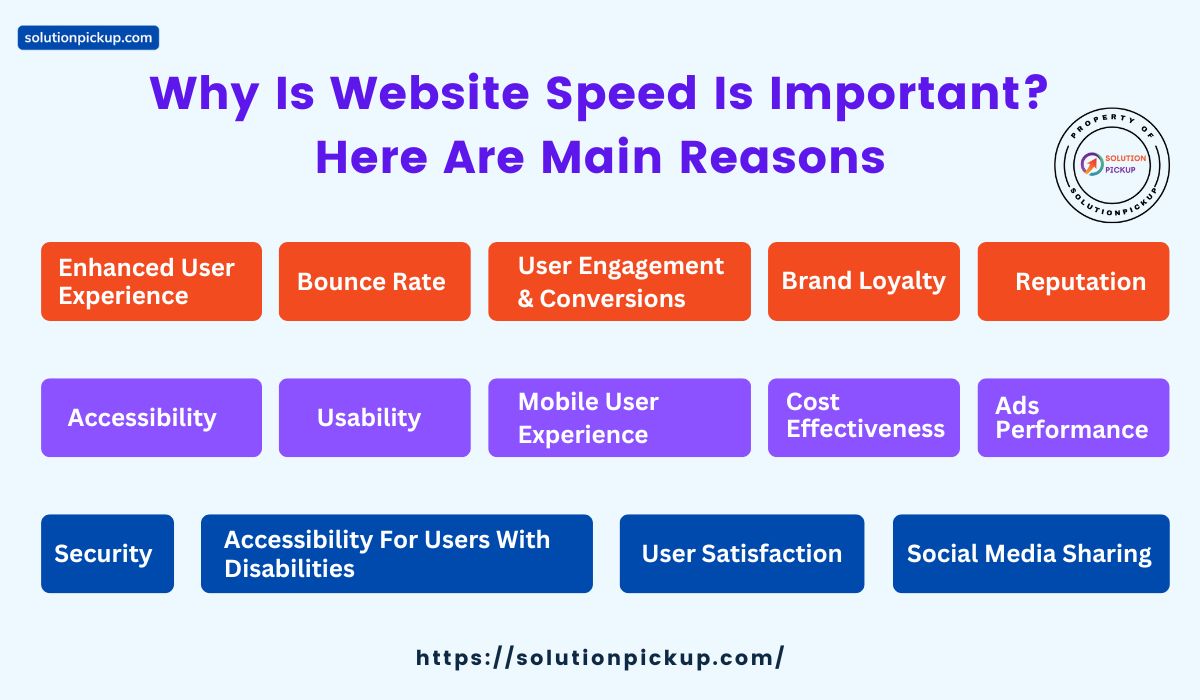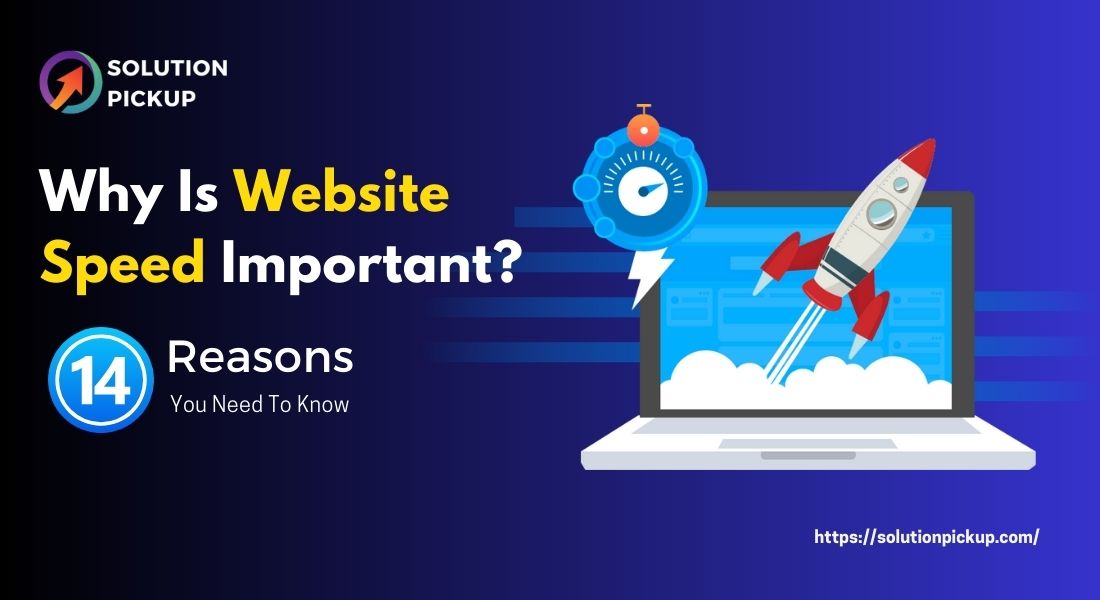A website’s load and response time are measured by its speed. Both user experience and search engine optimization are affected by it, so website owners must take it into account. We will examine the benefits of website speed for users and how website owners can optimize their website speed to rank higher in search engines.
What is Website Speed?
Page load time, or website speed, is the time it takes to load its content fully. You can include text, images, videos, or other content in this category. Various factors, such as the website’s design, server response time, and the size of images and videos, can affect it.
why is website speed is important? Here are Main Reasons:
Website load times are also important for search engine optimization (SEO). Google claims that site speed is a factor in determining search engine results, so sites that load more quickly will perform better. Google Page Speed insights offer website performance data and improvements. Website owners that optimize speed get more visitors and customers.

Enhanced User Experience:
Website performance is essential to user experience. Slow-loading websites frustrate, annoy, and increase bounce rates, whereas fast-loading ones improve user experience. A few seconds of lag might make users quit a website. A quicker website may boost user engagement, site time, and conversions. For the greatest user experience, website owners should emphasize website speed optimization.
bounce rate:
Website speed strongly affects bounce rate. Visitors need to read the information to leave a slow-loading website—high bounce rates damage search engine rankings and cost businesses. A speedy website reduces bounce rates and increases user engagement. Website owners may enhance conversions by keeping users on their site longer by increasing the website performance.
user engagement and conversions:
User engagement and conversions depend on website performance. Faster websites engage users and increase conversion rates. Fast-loading websites keep visitors longer. If the site is quick and responsive, they’re more inclined to use its functions, including filling out forms or buying things. Yet, a sluggish website might dissuade consumers, increasing bounce rates and lowering conversion rates. To maximize user engagement and conversions, website owners must prioritize performance improvement.
mobile user experience:
Website performance affects mobile user experience more than desktop. Mobile consumers are more attentive to webpage performance since their internet connections are slower. A slow-loading mobile website can frustrate, annoy, and increase bounce rates. Mobile customers are on-the-go and have less time to wait for a website to load. So, mobile website performance optimization is essential for customer satisfaction and mobile traffic retention.
Reputation:
Having a slow-loading website can also negatively impact your brand’s reputation. Slow websites are perceived as outdated and unreliable by users.
Accessibility:
When your website loads quickly, you can make it more accessible to users with slow internet connections or older devices.
Usability:
The user experience is improved when a website loads quickly, making it easier for them to find the information they need.
Cost Effectiveness:
The faster your website loads, the fewer resources you’ll need to host and maintain it and the more conversions you’ll get, resulting in a higher return on investment.
Brand loyalty:
It leads to repeat business and brand advocacy if a website loads quickly and provides a good user experience.
Ads performance:
You may also notice decreased click-through rates and revenue from your ads if your website loads slowly.
Social media sharing:
Fast-loading websites are also more likely to generate social media shares. Users are more likely to share content from a website that loads quickly, increasing visibility and engagement on social media.
User satisfaction:
If your website loads quickly, you are more likely to build a loyal customer base, as happy users will tell others about your website and return.
Accessibility for users with disabilities:
The loading speed of a website can also affect the accessibility of the site for users with disabilities. Users who rely on assistive technology may encounter delays if a website loads slowly, which makes the site more challenging to navigate.
Security:
Having a slow-loading website can also be a security risk. Hackers can exploit vulnerabilities in slow-loading websites, leading to data breaches and other security issues.
Factors That Affect Website Speed
Many things impact website speed. Images, videos, and scripts load slowly because of their size. Hosting company and server location might also affect website loading speed. Design, cache, and optimization impact website performance. These elements must be analyzed and optimized to improve website performance and user experience.
Technical issues:
Several factors can affect the speed of a website, including server response time, website design, and the size of images and videos. Website owners must optimize these factors to improve the speed of their websites.
Website Hosting:
It is also possible for website hosting to affect website speed. To ensure optimal website speed, website owners should choose a reliable and fast web hosting provider.
Server Issues:
A slow server can slow the loading time of a website. When other websites on the same server consume a lot of resources, shared hosting websites can experience slow speeds.
Large Media Files:
A website can be significantly slowed down by images and videos not optimized for web use. Media files with large sizes take longer to load, leading to a slow website.
Code Bloat:
It can take a long time for a website to load if its code needs to be updated. It takes longer for the page to load because the browser has to process a large amount of code.
Plugin Overload:
Plugins can slow down the loading time of a website if there are fewer of them. As a result of plugins adding additional code, websites may take longer to load and take more time to process.
Lack of Caching:
The purpose of caching is to reduce loading times by storing frequently accessed data, such as images and web pages. Websites without caching must retrieve data from the server every time they load a page, resulting in slower loading times.
Best practices for optimizing website speed:
Optimizing website speed can improve website performance. To optimize the speed of your website, follow these best practices:
Optimize Images:
Large image files can slow down the loading of a website significantly. Compressing images without sacrificing quality, resizing them to a smaller size, and using modern image formats such as WebP can optimize website images.
Minimize HTTP Requests:
Slowing down website loading times is possible by making too many HTTP requests for every element on a webpage. Using CSS sprites, combining multiple stylesheets, and reducing the number of elements on a webpage can minimize HTTP requests.
Use a Content Delivery Network (CDN):
In addition to reducing server response times and improving website loading times for users, a CDN distributes website content across multiple servers.
Enable Browser Caching:
The cache allows the browser to store website files, so they don’t have to be reloaded whenever a user visits the site. Repeat visitors will benefit from faster website loading times.
Minify CSS and JavaScript:
A minified reduces the size of CSS and JavaScript files by removing unnecessary characters and whitespace. By reducing their size, these files can improve website loading times.
Use a Reliable Hosting Service:
Choosing a fast, reliable, reliable hosting service with adequate resources can affect the speed of a website.
Optimize Website Design:
The design of a website can also affect its speed. Choosing a design with minimal elements and clean code will help websites load faster.
Conclusion:
In conclusion, website speed seriously improves search engine optimization and provides a positive user experience. The speed of a website can affect the bounce rate, conversion rate, and search engine ranking of the website. Alternatively, faster website speed can improve user engagement, conversion rates, and search engine rankings.
Utilizing speed testing tools and implementing best practices for website speed optimization can help website owners identify and resolve website speed issues. The result can be an improved user experience, increased traffic, and improved business results. Thus, web owners must prioritize website speed as part of their overall strategy and make it a top priority.
Frequently Asked Questions (FAQs)
What is website speed?
Generally speaking, the time it takes a website to load and display all its content is called its website speed.
Why is website speed important?
A fast website improves user experience, improves search engine rankings, and increases conversions and sales.
How can I test my website speed?
Pingdom, Google’s Page Speed Insights, GT Metrix, and Google’s Page Speed Insights are some of the tools available for testing the speed of your website.
What factors affect website speed?
Many factors can influence a website’s speed. These factors include the server’s response time, the size of images and files, the design and layout of the website, and the way it is hosted.
What are some best practices for optimizing website speed?
There are several best practices for optimizing the speed of a website. These include minimizing the size of images and files, reducing HTTP requests, utilizing browser caching, and optimizing the website’s code.
How can slow website speed impact my business?
The slow speed of a website can cause a high bounce rate, a decrease in conversions, and poor ranking in search engines. This can negatively impact business as a whole.
Can website speed be improved?
There is a possibility to improve website speed by implementing best practices for optimizing website speed and utilizing speed testing tools. This will enable us to identify and resolve issues that may slow down the website. Therefore, optimizing website speed is certainly possible.
How can website speed impact SEO?
Undoubtedly, website speed is one of the most significant ranking factors for search engines such as Google. It is imperative to remember that a slow website speed will result in a lower ranking for search engines. This will make it more difficult for your website to be found.
Does website speed only affect desktop users?
Neither desktop nor smartphone users are exempt from website speed issues. As mobile devices become increasingly popular for browsing the internet, it is of the utmost importance for websites to be optimized for mobile devices.
Can website speed affect my website's bounce rate?
Yes, users can leave a website if it takes too long to load and load. The bounce rate will also increase if the loading time is too long.

